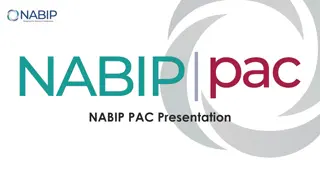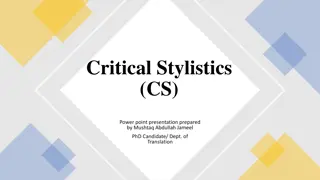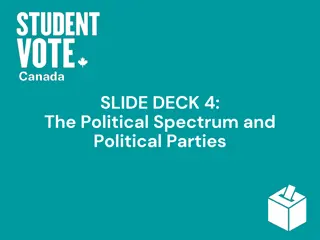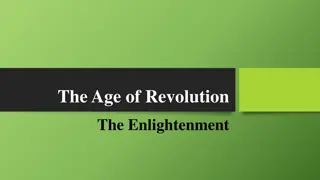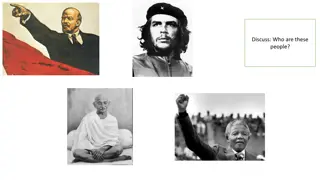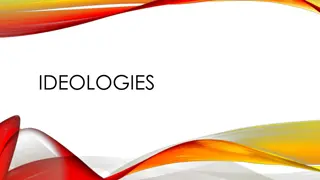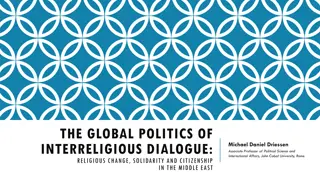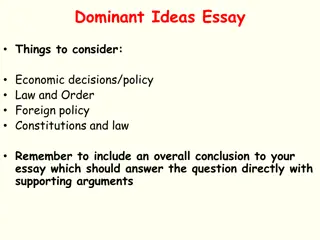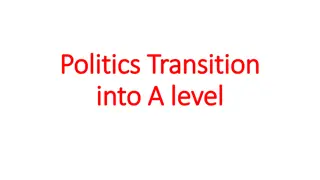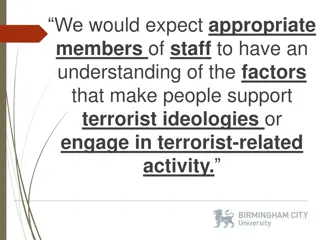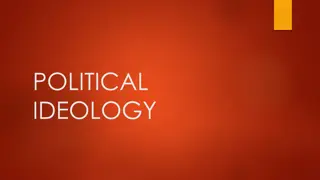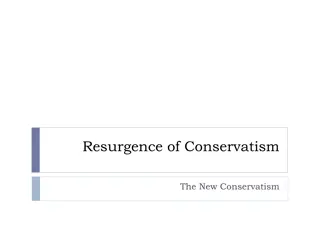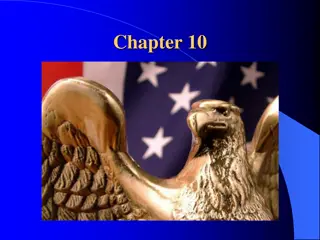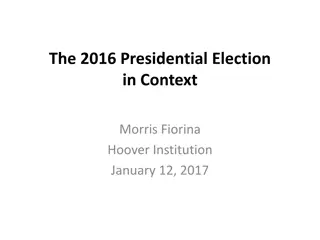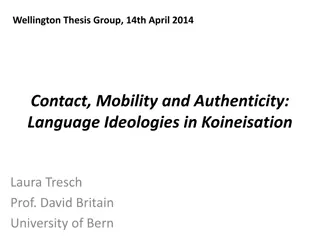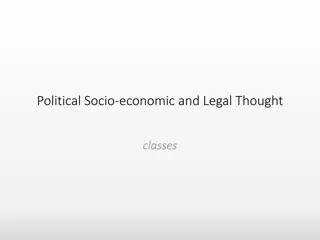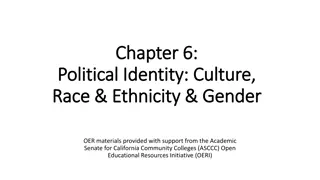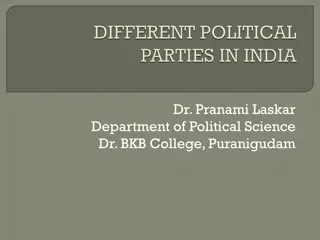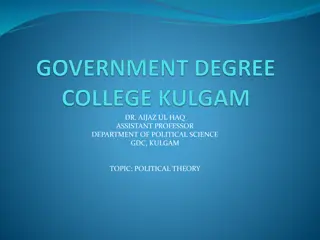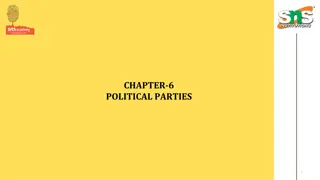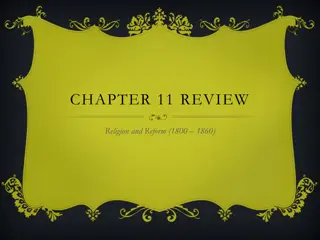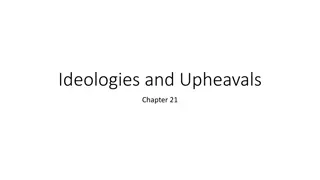Understanding NABIP PAC: Political Action Committee Overview
Federal law prohibits direct financial contributions to federal candidates, hence organizations like NABIP establish Political Action Committees (PAC) to advocate for political priorities. Learn about NABIP PAC, its accounts, eligibility criteria, contribution rules, and how funds are utilized. Disc
1 views • 14 slides
Contrasting Concepts in Political Science: Normative vs Descriptive Approaches
Normative and descriptive concepts in Political Science explore contrasting viewpoints on how things should be versus how they actually are. While normative claims focus on value judgments, descriptive claims deal with facts. These concepts complement each other by providing both theoretical and pra
0 views • 10 slides
Understanding Critical Stylistics: Tools and Application
Critical Stylistics (CS) is a method that delves into the ideological underpinnings of texts through the analysis of linguistic features. Developed by Jeffries, CS focuses on uncovering implicit ideologies embedded in texts by examining stylistic choices. By integrating stylistics and critical disco
2 views • 28 slides
Understanding the Political Spectrum and Ideologies
Explore the political spectrum, ideologies, and the role of government in society. Learn about the differences between the left and right, economic vs social issues, and the debate surrounding traditions and societal change. Dive into discussions on government services, taxes, traditions, and societ
0 views • 15 slides
Enlightenment Thinkers and Their Ideals
The Age of Revolution was marked by influential Enlightenment thinkers such as Thomas Hobbes, John Locke, Montesquieu, and Jean-Jacques Rousseau. These philosophers explored human nature, government, and society, shaping modern political thought. Hobbes emphasized a pessimistic view, advocating for
2 views • 9 slides
Revolutionaries Throughout History: From Lenin to George Washington
Explore the lives and ideologies of influential revolutionaries such as Lenin, Che Guevara, Nelson Mandela, Gandhi, and George Washington. Dive into their causes, ideologies, use of violence, and desire for change, drawing parallels between them and assessing their impact on history.
0 views • 16 slides
Interdisciplinary Approach in Political Science and Its Relation with History
The need for an interdisciplinary approach in political science emerged in the 20th century to study political issues from various social science perspectives. This approach emphasizes the interrelation between political science and other disciplines like history. History provides the foundation for
0 views • 23 slides
Institutionalism and Methodological Issues in Political Science
Institutionalism is a foundational concept in political science, emphasizing the study of governing institutions and their role in shaping political behavior. It explores inductive and deductive approaches to research, highlighting the significance of empirical evidence and theoretical assumptions.
0 views • 19 slides
Overview of Political Ideologies
Explore various political ideologies ranging from individualism to communism, each with distinct beliefs on government intervention, economic policies, and social structures. From libertarianism to fascism, understand the core principles and characteristics that define these ideologies.
0 views • 8 slides
State-Sponsored Interreligious Dialogue in the Middle East: A Political Analysis
This research delves into the growth of state-sponsored interreligious dialogue initiatives in the Middle East between 2000-2020. It explores the political significance, impact on relations between political and religious authorities, and implications for religious practices in the region. The thesi
0 views • 23 slides
Understanding Gramsci's Political Theory and its Relevance Today
Gramsci's political theory, focusing on concepts such as hegemony, historical bloc, and the role of intellectuals, offers valuable insights into contemporary political challenges. Explored through the lenses of Prof. Ken Spours and Stuart Hall's analytical tradition, this analysis sheds light on Con
0 views • 13 slides
Impact of Dominant Ideas on Electoral Performance: A Comparative Analysis of Thatcherism and New Labour's Third Way
Examining the influence of dominant ideas on electoral success, this essay delves into the contrasting ideologies of Thatcherism and New Labour's Third Way within British politics. By scrutinizing their economic decisions, foreign policies, and overall governance, the essay analyzes how these ideolo
0 views • 8 slides
Evolution of Citizenship in Liberal Democracy
Citizenship within liberal democracy entails equal rights, duties, liberties, and constraints for individuals within a political community. The entrenchment of civil and political rights has shaped the struggle for membership and participation in political communities. Civil rights, essential for in
1 views • 11 slides
Understanding Political Theory through a Contextual Approach
Exploring G.H. Sabine's perspective on political theory through a contextual approach, emphasizing the importance of historical context and societal influences. Sabine argues that while political theory evolves with its contemporary politics, it should be analyzed within its specific time and social
0 views • 9 slides
A-Level Politics Transition and Curriculum Overview
Delve into the transition and curriculum structure of A-Level Politics, exploring topics such as democracy, political parties, electoral systems, US government, and political ideologies. Discover the teaching approach in Year 12 and Year 13, including key content areas, assessments, and exam prepara
0 views • 14 slides
Understanding Political Beliefs and Behaviors: A Comprehensive Overview
Explore the formation, evolution, and transmission of political beliefs, as well as the impact of differing beliefs and behaviors on the political process. Delve into platform issues, political affiliations, and their influences to gain a deeper understanding of the political landscape.
1 views • 53 slides
Understanding Nationalism in Political Science
Nationalism, a complex concept, defines the nation as the fundamental unit of political rule. It encompasses a mix of objective and subjective factors, including cultural, ethnic, and political traits. The definition of a nation is subjective, based on how its members perceive themselves as a distin
0 views • 27 slides
Understanding Factors Influencing Support for Terrorist Ideologies
Staff members should possess knowledge on factors driving people towards terrorist ideologies. The Prevent Strategy aims to combat extremism and prevent individuals from engaging in terrorist activities through promoting partnerships and upholding British values. However, challenges such as lack of
0 views • 43 slides
Understanding Political Ideologies: Liberalism and Conservatism Explained
Political ideologies shape beliefs about the role of government and societal balance between the public and private sectors. Liberalism focuses on individual liberty and government intervention for equality, while conservatism emphasizes limited government, traditional values, and free markets. Psyc
0 views • 25 slides
The Resurgence of Conservatism in America
The resurgence of conservatism in America has brought about a clear distinction between conservative and liberal ideologies. Conservatives emphasize limited government intervention, promoting free-market principles, individual liberty, and moral values. On the other hand, liberals advocate for gover
0 views • 14 slides
Understanding Political Parties and Ideologies in the United States
Exploring the development and dynamics of political parties in the United States, this content delves into the definition of political parties, the two-party system, the political spectrum, major parties' differences, and the roles of Democrats and Republicans. It also touches upon third parties' ch
0 views • 18 slides
Political Spectrum and Ideologies Explained
Explore the differences between liberals and conservatives with images depicting their beliefs on government intervention, individual responsibility, gun control, and more. Understand the political spectrum ranging from moderate to liberal to conservative through visual aids. Learn about Democrats a
0 views • 17 slides
Trends in U.S. Political Landscape: Polarization and Party Dynamics
The analysis delves into the evolution of the U.S. political scene, highlighting shifts in party majorities, polarization among liberals and conservatives, maintenance of moderate factions, the significance of independents, and the dominance of centrist issues. It explores the challenges posed by th
0 views • 37 slides
Understanding Political Science: A Comprehensive Overview
The study of political science delves into various aspects, from the pursuit of the good society to the exercise of power and the allocation of resources. It encompasses specialized fields such as American politics, international relations, comparative politics, public policy, and political philosop
0 views • 5 slides
Language Ideologies in Dialect Contact Situations
The study explores how language ideologies influence the legitimacy and status of different dialect varieties in contact situations. It delves into the construction of power relations, social sameness and difference, and cultural stereotypes through language use. Key concepts such as language ideolo
0 views • 28 slides
Political Development Theory and Practice: An Overview
Political development refers to the evolution of institutions forming the political power system of a society. Initially popular in the 60s-70s to describe political change, it later fell out of favor for being Euro-centric but has since regained significance. The concept encompasses aspects like po
0 views • 13 slides
Comprehensive Guide to Political, Socio-Economic, and Legal Thought Classes
This comprehensive guide covers topics for essays and presentations in Political, Socio-Economic, and Legal Thought classes. It includes deadlines, presentation subjects, essay requirements, and examples like Plato's ideologies on State, Economy, Law, Bio, Morality, and Society. Students must adhere
0 views • 11 slides
Political Party Funding Act 2018 Overview
The Political Party Funding Act of 2018 in South Africa aims to enhance multi-party democracy by regulating the funding and donations to political parties. It establishes the Multi-Party Democracy Fund funded by private sources, alongside the existing Represented Political Party Fund. The Act prohib
0 views • 17 slides
Understanding Political Party Funding Act of 2018
The Political Party Funding Act of 2018 regulates the funding of political parties in South Africa, ensuring equitable and proportional funding for parties participating in national and provincial legislatures. The Act defines various terms such as donations, foreign persons, and political parties,
0 views • 42 slides
Evolution of Political Ideas and Influences on American Founding
In the history of politics, major ideas like laws of nature, unalienable rights, divine right of kings, social contract theory, and rights of resistance have influenced the American founding. Various traditions such as Judeo-Christian, English common law, Enlightenment, and republicanism played a si
0 views • 68 slides
Explore the Fascinating World of Political Science
The Department of Political Science offers a range of courses, delving into topics such as political theory, international relations, and governance. Understand the distinction between politicians and political scientists, and explore branches of political science like public administration and huma
0 views • 16 slides
Understanding Political Identity: Culture, Race & Gender in Society
Explore the intricate aspects of political identity, culture, race, ethnicity, and gender in society. Discover how individuals shape their identities and the impact of political mobilization on society. Uncover the significance of political socialization and the role of societal institutions in shap
0 views • 20 slides
Evolution of Political Protests in Modern Russia: A Historical Overview
This article provides an in-depth analysis of the evolution of political protests in modern Russia from 1990 to present. It discusses the attitude of Russian journalists towards protests, basic concepts of political protest in modern political science, myths surrounding protests in Russia, and the f
0 views • 24 slides
Overview of Major Political Parties in India
Explore the characteristics and recognition criteria of political parties in India, including national parties like BSP, BJP, CPI, CPIM, INC, and NCP. Learn about their symbols, ideologies, and significance in the political landscape of India.
0 views • 12 slides
Impact of Political Stability on Equity Trading Costs of Cross-Listed Firms
The research explores the relationship between political stability and equity trading costs of cross-listed firms, highlighting the impact of political institutions, liquidity, and investor protection. It delves into the importance of factors like quality of political institutions, transparency, and
0 views • 24 slides
Interdisciplinary Relationships in Political Science
Political science and history share a symbiotic relationship, with history providing the foundation for political analysis while political science influences historical events. The contribution of economics to political science is evident in how economic conditions shape political ideologies and pol
0 views • 12 slides
Understanding Political Theory: Definitions, Differences, and Significance
Political theory encompasses systematic explanations of political phenomena, distinct from political thought which involves ideas and opinions of philosophers. It constitutes both political science and philosophy, addressing both empirical and evaluative aspects. The significance lies in finding sol
0 views • 7 slides
Remedial Measures Implemented by Indian Political Party
Explore the impactful remedial measures taken by a prominent political party in India through a collage presentation. Delve into the functions of political parties, understanding partisanship, the necessity of political parties, and more. Gain insights into the significance and role of political par
0 views • 23 slides
Religion and Reform: 19th Century Ideologies and Movements
Explore the influence of individualism through transcendentalism, rural communalism, and urban popular culture in the 1800s. Delve into the ideologies of Ralph Waldo Emerson, Henry David Thoreau, Margaret Fuller, and Walt Whitman. Learn about utopian societies, the Mormon experience, and nativist mo
0 views • 15 slides
Ideologies and Upheavals: Congress of Vienna and Impact
The Congress of Vienna, a gathering of key European powers, aimed to establish lasting peace after Napoleon's defeat. Key agreements included territorial compensation, restoration of monarchs, and the formation of the Holy Alliance. While successful in preventing major wars, the Congress lacked fore
0 views • 19 slides
